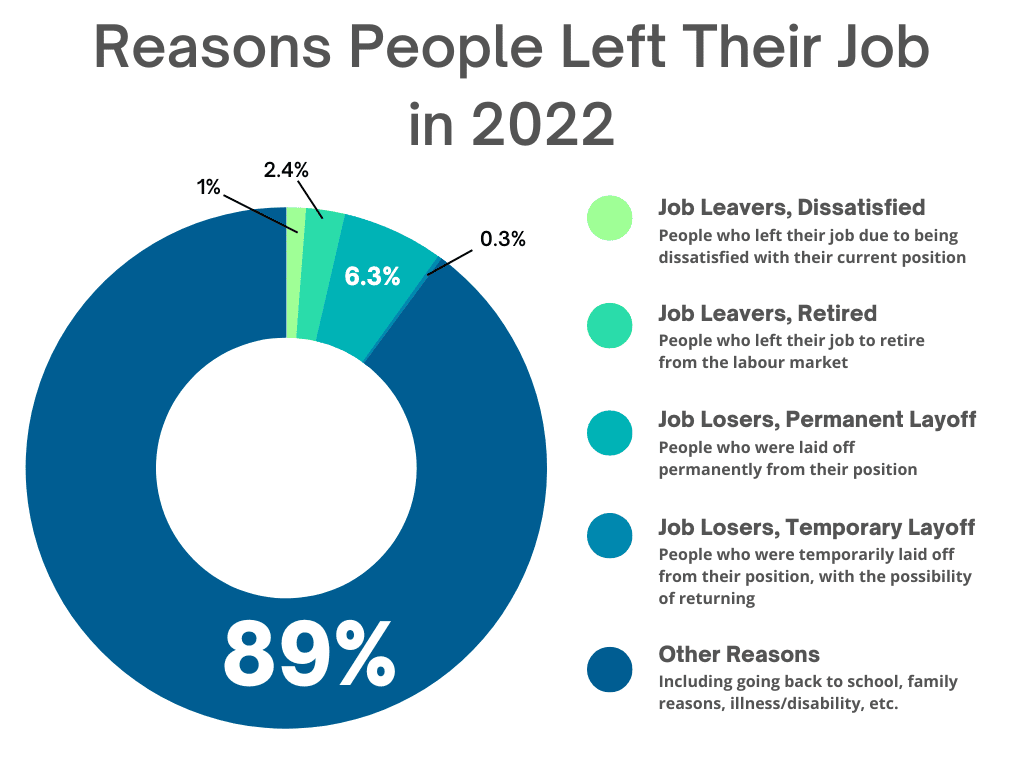Why do people leave their jobs in Canada?
A new study by Statistics Canada reveals that workers in Canada overwhelmingly leave their jobs for reasons other than being laid off, or unsatisfied with their employment.
Learn more about Canadian immigration and discover your options
Some of the most common reasons for leaving a job included going back to school, retiring, having an illness or disability, and personal/family reasons.
Canada is poised to welcome over 1.45 million new immigrants in the next three years, the majority of which will be economic immigrants who will help address the historic labour shortages Canada is currently experiencing.
However, do the country’s current labour conditions suggest that these new immigrants will find work that is reliably secure, and that they are content with? Statistics Canada’s recent study suggests favourable answers to these crucial questions.
Looking at responses from monthly Labour Force Surveys, the study aimed to shed light on why people reported leaving their jobs in 2022.
Results and key findings
The study focused responses around four broad categories, with sub-reasons given for each:
- Job Leavers: encompassing “Own illness or disability”, “Personal or family reasons”, “Going to school”, “Dissatisfied”, “Retired”, and “Other reasons”;
- Job Losers: encompassing “Permanent Layoff”, and “Temporary Layoff”;
- “Have not worked in the last year”; and
- “Never Worked”.
To simplify these responses are broken down into the following three categories:
- Job Leavers: “Dissatisfied”, “Retired”;
- Job Losers: “Permanent Layoff”, “Temporary Layoff”;
- All other reasons will be cumulatively totaled as “Other”
The pie chart breakdown of scores in percentages can be seen below:

These responses help paint a broad picture of Canada’s labour market conditions.
Good signs for job security
Layoffs (identified as “job losers” in the study) afflicted less than 10% of respondents. Among the total number of responses, people who lost their job totaled at just 6.6% throughout the year. This number was mostly comprised of people who had been permanently laid off; with temporary layoffs making up just 0.3% of the total.
This is an encouraging sign for those looking to join Canada’s labour market. Per the results of the study, job security remains strong in Canada, with very few layoffs throughout the year, and little to no interruption in regular employment for those with a job. Many of these layoffs in 2022 were also focused in the technology sector—as large companies laid off staff internationally, and Canadian start-ups struggled to raise capital in the face of higher inflation rates.
High satisfaction among workforce
Job leavers who were dissatisfied with their current employment made up just 1% of total respondents—indicating strong employment satisfaction among workers. This is consistent with other data that is available on Canadian job satisfaction: a 2016 study also conducted by Statistics Canada found that out of 15,167 respondents, 83% (12,730) reported being either satisfied or very satisfied with their current employment.
A more recent study by Monster.com, and independent research company GfK found that Canadians were the most likely in the world to report either “loving” or “liking their job a lot”. The low rate of people leaving their job due to being dissatisfied in 2022, further bolsters the idea that people working in Canada are overwhelmingly satisfied with the employment that they find. Canada’s progressive labour laws (which protect foreign workers and Canadian nationals alike) are also to thank here.
This not only serves as another encouraging sign of good working conditions for new entrants in the labour market—but also (when considered alongside the historic labour shortages that Canada is currently experiencing), is a good sign that the country is ready and able to accept newcomers with a robust labour infrastructure to do so.
The real reasons
So why do most people leave their jobs in Canada? Overwhelmingly it is for reasons such as going back to school, dealing with a disability, family/personal reasons, and of course retirement.
Retirees are a consistent and particularly pertinent group to pay attention to, as their exit from the workforce is one of the key drivers of immigration to Canada. More than five million Canadians are set to turn 65 this decade (roughly 13% of the population) and exit the workforce (increasing labour demand as a result). In the face of low birthrates newcomers are crucial to helping Canada address the worker shortages that are likely to occur as this demographic retires—especially as the country is already seeing historic levels of job vacancy.
Key takeaways
The data covered above paints a picture of the Canadian labour market consistent with previous findings: Canada is a country with a high rate of labour satisfaction, strong job security, and a high number of retirees that exit the workforce every year, driving up labour demand in the country.
Overwhelmingly these are positive signs for newcomers; that they can come to Canada, that their skills (with some variance based on specific profession) will be in demand, and that they can find a job they are satisfied with and can retain for the longer term—while also being protected by Canada’s robust labour laws.
Learn more about Canadian immigration and discover your options
© CIC News All Rights Reserved. Visit CanadaVisa.com to discover your Canadian immigration options.
- Do you need Canadian immigration assistance? Contact the Contact Cohen Immigration Law firm by completing our form
- Send us your feedback or your non-legal assistance questions by emailing us at media@canadavisa.com







